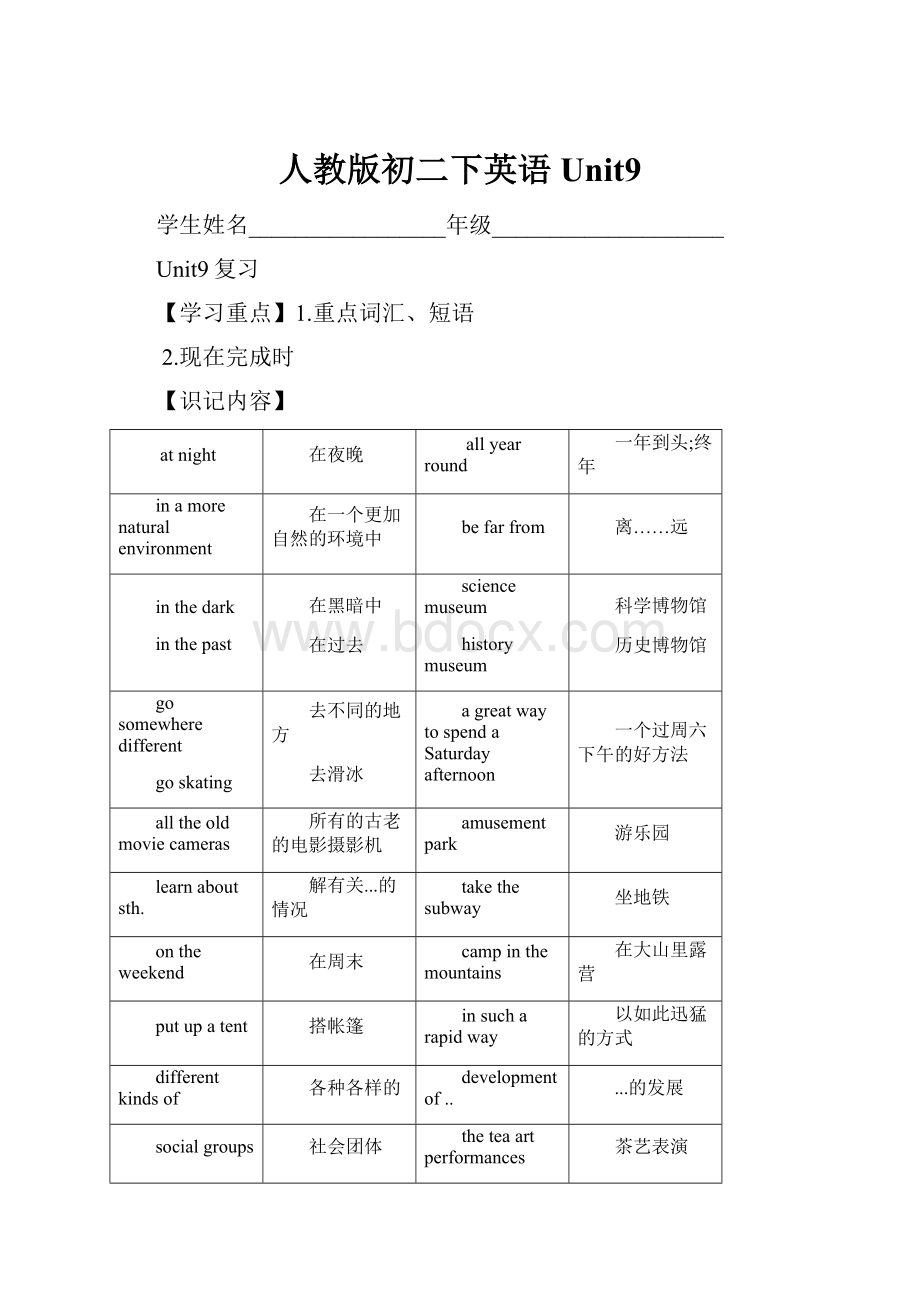人教版初二下英语Unit9.docx
《人教版初二下英语Unit9.docx》由会员分享,可在线阅读,更多相关《人教版初二下英语Unit9.docx(11页珍藏版)》请在冰豆网上搜索。

人教版初二下英语Unit9
学生姓名_________________年级____________________
Unit9复习
【学习重点】1.重点词汇、短语
2.现在完成时
【识记内容】
atnight
在夜晚
allyearround
一年到头;终年
inamorenaturalenvironment
在一个更加自然的环境中
befarfrom
离……远
inthedark
inthepast
在黑暗中
在过去
sciencemuseum
historymuseum
科学博物馆
历史博物馆
gosomewheredifferent
goskating
去不同的地方
去滑冰
agreatwaytospendaSaturdayafternoon
一个过周六下午的好方法
alltheoldmoviecameras
所有的古老的电影摄影机
amusementpark
游乐园
learnaboutsth.
解有关...的情况
takethesubway
坐地铁
ontheweekend
在周末
campinthemountains
在大山里露营
putupatent
搭帐篷
insucharapidway
以如此迅猛的方式
differentkindsof
各种各样的
developmentof..
...的发展
socialgroups
社会团体
theteaartperformances
茶艺表演
aniceplacetoenjoytea
一个品茶的好地方
thousandsof
数以千计的
makeaperfectcupofteawithbeautifulteasets
用漂亮的茶具沏一杯完美的茶
InternationalMuseumofToilets
1.国际厕所博物馆
theTerracottaArmy
兵马俑
SoutheastAsia
东南亚
NightSafari
夜间动物园
threequarters
四分之三
AnEnglish-speakingcountry
一个讲英语的国家
haveproblemdoingsth.
做某事很困难
duringthedaytime
在白天
acoupleoftimes
好几次
rightnow
现在;目前
anamusementparkwithaspecialtheme
一个有特别的主题的游乐园
walkaroundthepark
在公园里到处走
encouragesb.todosth
鼓励某人做某事
hearof
听说
takearide
兜风
anotherprovince
另一个省
theBird’sNest
鸟巢
havebeentosp.
去过某地
ontheonehand...ontheotherhand.
一方面,另一方面
【词性变化】
1.inventv.发明iventionn.发明物inventor发明者
collectv.收集;收藏collectionn.收藏品collectorn.收藏家
1.Acomputerisoneofthegreatest________inthiscentury.
A.inventorsB.inventionsC.invitationsD.invention
2.Theyoung_________hasovertwenty__________.
A.collector,collectorsB.collection,collections
C.collctor,collectionsD.collection,collectors
2、believev.信任believableadj.可信任的unbelievableadj.不可信的
usualadj.通常unusualadj.不寻常的
usually通常地unusually不寻常的
encouragev.鼓励encouragementn.鼓励
encouragingadj.鼓励的;促进的encouraginglyadv.鼓励地
socialadj.社会的societyn.社会
peacen.和平peaceful和平的
Germanadj.德国的;n.德国人Germanyn.德国
Indian.印度Indianadj.印度的;n.印度人
【小case】
1.——Couldyoupleasetellmesomethingaboutthetwo_________?
——________.TheyareexchangestudentsofNo.1MiddleSchool.
A.Frenchmans,ComeonB.Frenchmen;Yes,please
C.Germans;AllrightD.Germen;Notatall
2.TheycomefromIndiaandtheyare_______(India).
3.Agroupof_________willvisitthemusuemtomorrow.
A.EnglishmansB.IndianC.JapaneseD.Germen
【词汇辨析】
一、
rapid
adj.
物体或事情变化快
Shemadearapiddecision.
quick
adj.
adv.
动作快;行动机敏
Ihavetodosomequickthinking.
fast
adj.
adv.
速度快
Icanrunfast.
二、
sometimes
有时
Eg:
Evenfriendsarguesometimes.
sometimes
几次
Icalledyousometimesyesterday.
sometime
某个时刻
Isawhimsometimelastmonth.
sometime
一段时间
Ihaven'tseenyouforsometime.
【典例】
——Doyouoftengotothecinema?
——No,IoftenwatchmoviesonTV.But________Igotothecinemawithmyfriends.
A.sometimeB.sometimesC.sometimeD.sometimes
三、
mostly
adv.
大多数地
SheismostlyoutonSundays.
almost
adv.
几乎
Ialmostgottheanswer.
nearly
adv.
几乎(接近)
He'snearly80.
most
adj.
多数的
Moststudentsliketheteacher.
Theracersare_________oldpeopleintheneighborhood.
A.themostB.mostlyC.moreD.atthemost
特别提示
若在“百、千”这些单位前有具体数字既表示确切数量时,hundred,thousand,million,billion等不需要用复数形式。
Eg:
threehundredsixhundred
若在hundred,thousand等单位前没有具体数字时,用其复数+of,hundred,thousand,million,billion等并非表示具体数字,而是强调数量之多。
Eg:
hundredsofstudents
1.Thereare________booksinourschoollibrary.
A.hundredofB.hundredsofC.ninehundredsD.ninehundredsof
2.Morethanninestudentsaredoingsportsnow.【2011重庆江津】
A.hundredsB.hundredofC.hundredD.hundredsof
3.Youcansee_______ifyougooutatnight.
A.millionstarsB.thousandofstarsC.hundredsstarsC.millionofstars
4.Thereareover______studentsintheirschool.【泸州市2011】
A.hundredsB.ninehundredsC.hundredsofD.ninehundred
5.Lastyear,IvisitedachemicalfactoryinBaise,thereareabout_____workersinit.【2011广西百色】
A.sixthousandsB.sixthousandC.sixthousandsofD.sixthousandof
【分数表达】
1.abouttenthousandyearsago,_________oftheNorthChinawascoveredbyforests.
A.twothirdB.secondthirdC.twothirdsD.twothree
2.Thenumberofthestudentsinourgrade_______about______and________ofthemaregirls.
A.are,sixhundreds,twothirdsB.is,sixhundred,twothird
C.is,sixhundred,twothirdsD.are,sixhundred,twothird
1、结构。
_________________________________________________
2、用法。
1.__________________________________________________________
2.__________________________________________________________
3、标志词。
already(已经)_________________________________________
just(刚刚)___________________________________________
ever(曾经)____________________________________________
never(从不)____________________________________________
before(以前)___________________________________________
yet(仍)________________________________________________
【实战演练】
根据汉语提示用适当词的合适形式填空。
1.Ihavefinishedmyhomework.我已经做完家庭作业了。
2.Hehadhismeal.他刚吃过饭。
3.yousungthisEnglishsong?
你曾唱过这首英文歌吗?
4.Theystarted.他们还没有动身。
5.Weheardofit.我们从来没有听说过这件事。
6.Theplanearrived.飞机已经来了。
7.Ibeentothepostoffice.我刚才去邮局了。
8.MarybeentotheGreatWall.玛丽从未去过长城。
4、havebeen(to)、havegone(to)与havebeen(in)的区别
havebeen(to)表示“去过某地(现在已经回来了)”,
havegone(to)表示“去某地了(说话时某人不在当地)”,
havebeen(in)表示“呆在...多久了”
【练习】
1.UncleLicanspeakEnglishverywellbecausehe_____Englandfor5years.
A.hasgonetoB.hasbeentoC.hascometoD.hasbeenin
2.WhereisMr.Zhang?
—He_____London.
A.hasbeentoB.hasbeenC.hasgoneD.hasgoneto
3._____totheUnitedStates?
—No,never,butIwenttoCanadaafewyearsago.
A.HaveyoubeenB.HaveyougoneC.DidyougoD.Willyougo
5、一般现在时和现在完成时的区别
1.过去时表示过去某时发生的动作或单纯叙述过去的事情,强调动作;现在完成时为过去发生的,强调过去的事情对现在的影响,强调的是影响。
2.过去时常与具体的时间状语连用,而现在完成时通常与模糊的时间状语连用,或无时间状语。
一般过去时的时间状语:
yesterday, last week,…ago, in1980, in October, just now, 具体的时间状语
共同的时间状语:
this morning, tonight,this April, now, once,before, already, recently,lately
现在完成时的时间状语
for, since, so far, ever, never, just, yet,till / until, up to now, in past years, always,
现在完成时可表示持续到现在的动作或状态,动词一般是延续性的,如live, teach, learn, work, study, know.
过去时常用的非持续性动词有come, go, leave, start, die, finish, become, get married等。
I saw this film yesterday. (强调看的动作发生过了。
)
I have seen this film. (强调对现在的影响,电影的内容已经知道了。
)
Why did you get up so early?
(强调起床的动作已发生过了。
)
Who hasn‘t handed in his paper?
(强调有卷子,可能为不公平竞争。
)
She has returned from Paris. 她已从巴黎回来了。
She returned yesterday. 她是昨天回来了。
句子中如有过去时的时间副词(如 yesterday, last, week, in 1960)时,不能使用现在完成时,要用过去时。
(错)Tom has written a letter to his parents last night.
(对)Tom wrote a letter to his parents last night.
【实战演练】
用since或for
1)Wehavelearnedfivelessons__scince____thebeginningofthisterm.
2)MrsLiaohasbeeninhospital___scince___lastweek.
3)Ihavestayedatmyaunt’s_____twoweeks.
C.用havegone或havebeen
1)Wherearetheboystudents?
They_____totheschoolfactory.
2)Isyourfatherin?
No,he____toShenzhen._______heever______therebefore?
Yes,he___thereseveraltimes
3)HeaskedmeifI_____toHangzhoubefore.
ItoldhimthatIwantedtogothereforavisitasI____never____tothatcitybefore.
2.选择填空
1.Mother____meanewcoatyesterday.I_______iton.Itfitsmewell.
A.hadmade…havetried B.made…havetried
C.hasmade…tried D.made…tried
2“He____todrawhorsesalready”.“When______he?
”“Lastyear“
A.learned…has B.learned…did C.haslearned…has D.haslearned…did
3.Tom_____upintothetree.Look,he____highupthere!
A.hasgot…is B.hasclimbed…was C.got…was D.climbed…is
4.____you_____thetextyet?
Yes,we____ittwohoursago.
A.Did…copy…did B.Have…copied…have C.Have…copied…did D.Did…copy…had
5.“Why______she_______angry?
”“Becausehe_____atherjustnow.”
A.did…get…shouted B.has…got…shouted
C.did…get…hasshouted D.has…got…hasshouted
6.______you__________thefilmbefore?
Where_____you____it?
A.Have…seen…did…see B.Did…see…did…watch
C.Have…seen…have…seen D.Did…see…have…seen
7.You____mewaitingfortwohours.I____foryousincefive.
A.kept…waited B.havekept…waited
C.kept…havewaited D.havekept…havewaited
8.Where______John_______?
Tothelibrary.He_________thereforanhour.
A.has…been…hasgone B.has…gone…hasbeen C.did…go…went D.did…be…went
9.______thebabystill_____?
No,it_______crying.
A.Has…cried…hasstopped B.Is…crying…stopped
C.Did…cry…stopped D.Is…crying…hasstopped
10.I_______theway.I________hereforquitemanyyears.
A.knew…havelived C.knew…live C.know…havelived D.know…live
11._____youever_____America?
Yes,Ihave.
A.Have…goneto B.Have…gonein C.Have…beento D.Have…beenin
12.Mybrother____collegeforoverthreeyears.
A.hasgoneto B.hasbeento C.hasbeenin D.hasbeenat
13.He________theArmybytheendof1989.He______inthearmysincethen.
A.joined…is B.hasjoined…hasbeen C.hadjoined…is D.hadjoined…hasbeen
14.BythetimeI_____backthey____uptensatellites.
A.came…havesent B.came…hadsent C.come…havesent D.hadcome…sent
15.Jack____overfivelessonsbyseveno’clock.Thenhe____arest.
A.went…took B.went…hadtaken C.hadgone…took D.hadgone…hadtaken
16.We____outbythattimethathe____aspyforalongtime.
A.hadfound…hadbeen B.hadfound…was C.found…hadbeen D.found…was
17.Beforet